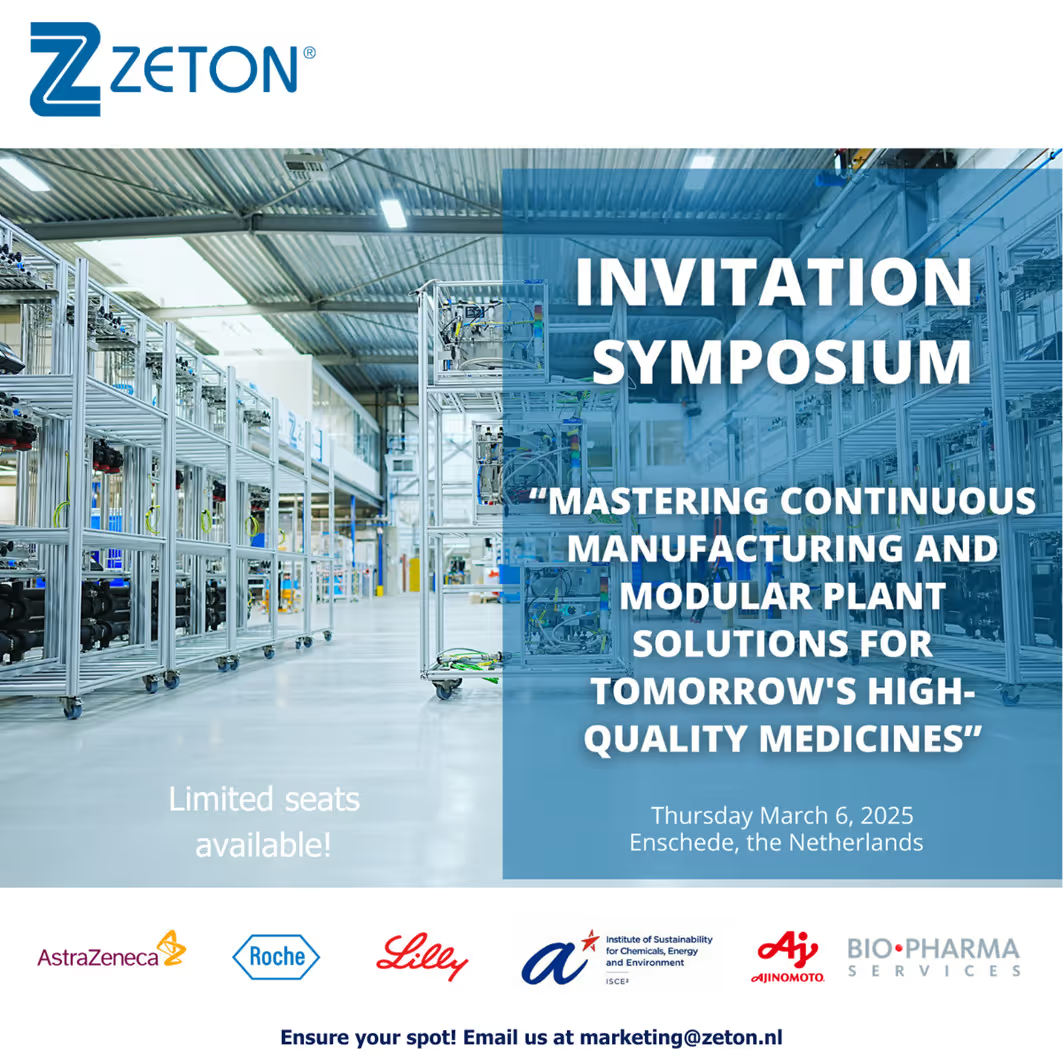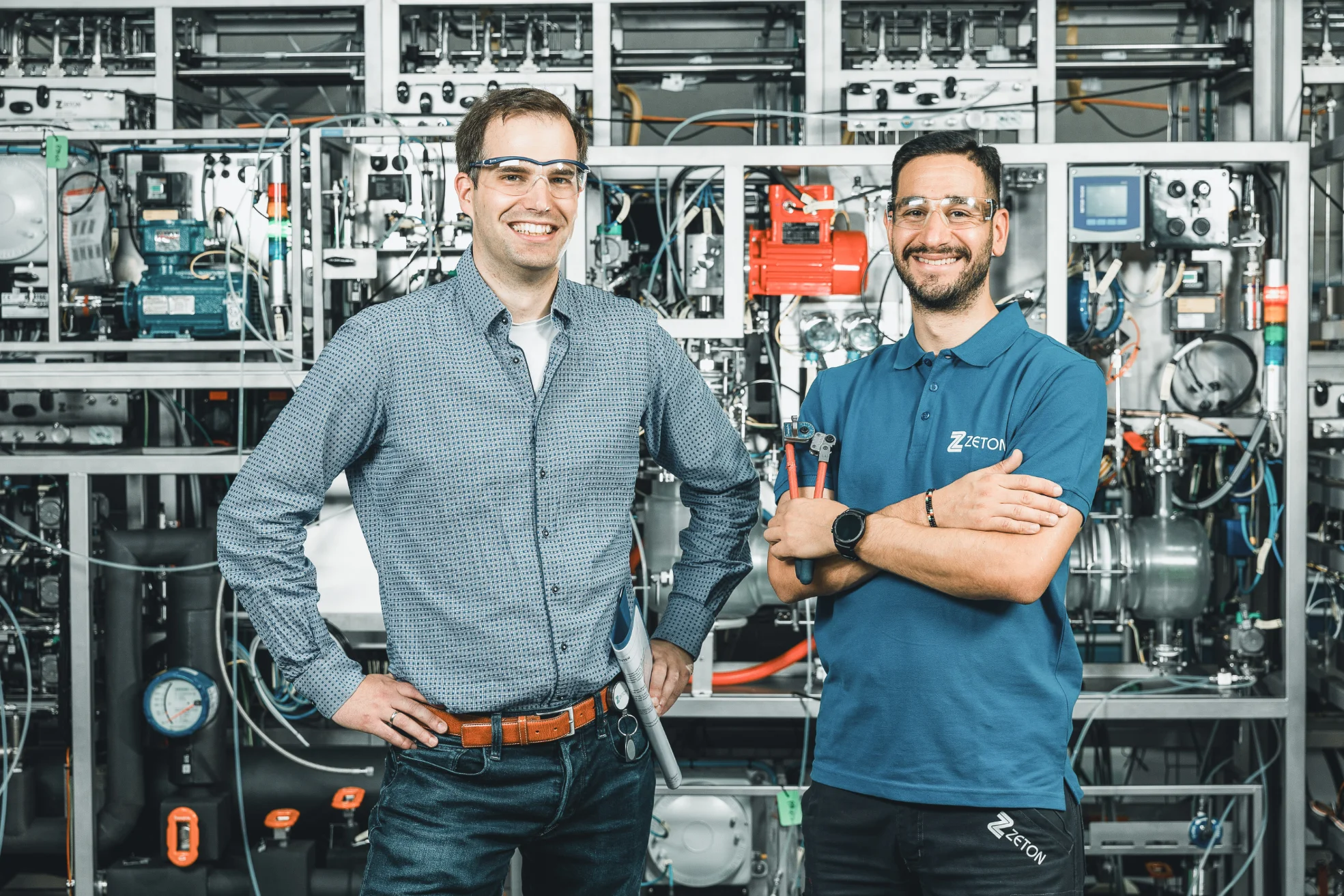PAST EVENT: Zeton Symposium: "Innovative Horizons: Mastering Continuous Manufacturing and Modular Plant Solutions"
Zeton B.V. has organized a symposium on March 6, 2025 titled "Innovative Horizons: Mastering Continuous Manufacturing and Modular Plant Solutions." Industry leaders have showcased modular plant solutions and automation approaches, demonstrating the integration of continuous manufacturing and flow chemistry. The event included a manufacturing shop tour and provided an opportunity to understand cutting-edge modularization solutions.
What is continuous manufacturing?
Continuous manufacturing (CM) is a production approach where input materials are continuously fed into a process and transformed into output products in a seamless, uninterrupted flow. Unlike batch manufacturing, which operates in discrete steps with hold times in between, CM enables real-time processing and monitoring.Key characteristics include:
- Steady-state operation with consistent process conditions
- Integrated unit operations (e.g. reaction, separation, crystallization)
- Real-time process analytics (PAT) for quality control
- Smaller equipment footprint and faster scale-up
- Improved safety
due to smaller reaction volumes at any given time, CM is particularly well-suited for pharmaceutical and fine chemical production, where precision, reproducibility, and regulatory compliance are critical.
Learn more
Why should I consider switching from batch to continuous manufacturing in pharmaceutical production?
Some of the major benefits of continuous manufacturing (CM) include:
• Faster speed to market – reduced development and production timelines
• Better process control – real-time monitoring and automation improve consistency
• Smaller factories and environmental footprint – compact, energy-efficient systems
• More consistent product quality – steady-state operation reduces variability
• Lower operational costs – less waste, fewer manual interventions
• Improved safety – smaller volumes and better containment
Is continuous manufacturing only suitable for large - scale production?
Not at all. Modular systems like ContiUnity® are designed to be scalable. You can start small — for development or clinical production — and scale up as needed.
Do I need to rebuild my entire facility if I want to switch to continuous manufacturing?
No. One of the key advantages of a system like ContiUnity® is its modular and compact design. It can be installed alongside your existing batch infrastructure, allowing you to implement continuous manufacturing gradually. You can start with a single process step or pilot line and expand over time — without the need for a complete facility overhaul.
How can we help you transition to continuous chemistry?
At Zeton, we understand that moving to continuous chemistry isn’t just a technical decision. It’s a strategic shift that affects your entire organization. That’s why we don’t start with a standard solution, but with a meaningful conversation.
We take the time to understand your situation, goals, and challenges. As your partner, we work alongside you to map out where you are now and what’s needed to move toward safe, efficient, and future-proof production. Whether you're still exploring options or already have concrete plans, we’re here to think along, ask the right questions, and offer hands-on support—from concept to realization.
How does validation work? Is ContiUnity® GMP-compliant?
Yes. ContiUnity® is designed to meet GMP (Good Manufacturing Practice) requirements and supports compliance throughout the entire lifecycle of the system. Validation is embedded in the engineering and delivery process, minimizing the burden on your internal QA and validation teams.Key aspects include:• Factory Acceptance Testing (FAT): Each module is fully assembled and tested at Zeton’s facility, including functional testing, documentation review, and pre-validation.• GAMP5-aligned automation: The control system is developed according to industry standards, with audit trails, user access control, and electronic records.This approach reduces on-site commissioning time and ensures a faster, more reliable path to GMP-compliant operation.
Is it difficult to train staff for continuous manufacturing?
Zeton has extensive experience guiding companies through this transition and offers a dedicated training program tailored to teams working with the ContiUnity® system. This includes hands-on instruction, process understanding, and cross-functional alignment to ensure a smooth and confident adoption.
What if I want to modify my process later on?
Thanks to its modular design, ContiUnity® allows you to easily add, replace, or reconfigure modules without redesigning the entire system. Even a single additional module can enable entirely new processes, making it a highly flexible and cost-effective solution for evolving production needs.
How does continuous manufacturing differ from batch production?
Batch production works in discrete steps. Continuous manufacturing runs uninterrupted, offering:• Real-time monitoring• Consistent product quality• Reduced waste and energy usage• Faster response to process changes
Is continuous manufacturing more complex to operate?
Not necessarily. While it requires a different mindset and setup, systems like ContiUnity® are designed to be intuitive and operator-friendly, with built-in automation and safety features.
Why now is the time to transition from batch to continuous manufacturing
The shift from batch to continuous manufacturing is no longer just an innovation—it's becoming a competitive necessity. Companies that embrace this transformation position themselves to respond faster to market demands, improve product quality. The journey begins with a strategic assessment: Which parts of your process are ready for continuous flow? Where can modularity unlock flexibility and scalability?By taking a phased, data-driven approach, organizations can de-risk the transition while building a future-proof manufacturing model. Continuous manufacturing isn’t a one-size-fits-all solution—but for those ready to lead, it offers a powerful path to smarter, more agile production.
How does ContiUnity® support flexible and GMP-compliant manufacturing?
ContiUnity® is a highly adaptable, GMP-compliant manufacturing platform designed to support the swift implementation of new processes and products. Its flexible architecture ensures seamless integration into evolving production environments, while maintaining full adherence to regulatory standards and quality requirements.
How do modular skid systems support fast and flexible scale-up in pharmaceutical manufacturing?
Modular skid systems enable rapid and reliable scale-up by combining pre-engineered, pre-validated process units into compact, easily deployable modules. Their standardized design allows for quick installation and integration into existing facilities, significantly reducing downtime and engineering effort. Moreover, their modular nature makes it easy to switch between different processes or products, offering the flexibility needed to respond to changing production demands or market needs—all while maintaining GMP compliance and operational consistency.
Why is continuous manufacturing a strategic advantage for CDMOs?
For CDMOs, adopting continuous manufacturing is a forward-looking investment that enhances competitiveness, operational efficiency, and client value. It enables faster turnaround times, greater flexibility in handling diverse projects, and more consistent product quality—key differentiators in a crowded market. Continuous processes also support easier scale-up, reduce resource consumption, and align with growing industry demand for agile, sustainable production solutions. By offering these capabilities, CDMOs can attract innovative pharmaceutical partners and position themselves as leaders in next-generation drug manufacturing.

Join Our Exclusive Symposium on Continuous Manufacturing and Modular Plant Solutions
On March 6, 2025, Zeton invites you to an exclusive industry symposium: "Mastering Continuous Manufacturing and Modular Plant Solutions for Tomorrow's High-Quality Medicines."
This symposium is designed specifically for CMOs, pharma producers, and fine chemical manufacturers, offering unique insights into the latest advancements and challenges in modular and continuous manufacturing.
What to Expect:
Gain valuable insights from industry leaders on:
- The Evolution of Modular Approaches: From past to future.
- Flexibility & Collaboration: Learn how to create adaptable manufacturing processes and benefit from shared experiences.
- Overcoming Limitations: Solutions for tackling challenges in continuous manufacturing.
- Standardized Engineering: Implementing modular, standardized automation solutions (e.g., MTP).
- Opportunities & Challenges: Opportunities and challenges in continuous manufacturing in both pharma and non-pharma sectors, including 24/7 operation challenges and staffing resources, and plug and play in GAMP environments: challenges faced and solutions
Exclusive Shop Tour
As part of the event, participants will have the opportunity to visit Zeton BV and explore various ongoing projects, including the fully operational ContiUnity® process system.
Confirmed Speakers:
- Gareth Alford, AstraZeneca
- David Linder, F. Hoffmann - La Roche Ltd.
- Rick Spencer, Eli Lilly
- Gabriel Loh, A*STAR Institute of Sustainability for Chemicals, Energy & Environment (ISCE2)
- Bert Metten, Ajinomoto Bio-Pharma Services
Practical Details
- Location: University of Twente, Building Vrijhof, Enschede, the Netherlands
- Date: March 6, 2025
- Registration Fee: €90 (Net revenue will be donated to the Princess Máxima Center Foundation)
- Registration Deadline: January 31, 2025
Seats are limited! Don’t miss this opportunity to connect with industry leaders and shape the future of modular and continuous manufacturing
For more information or to secure your spot, contact us at: marketing@zeton.nl.




